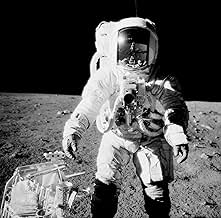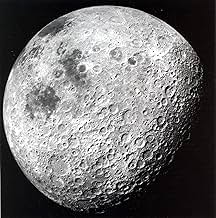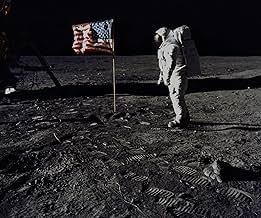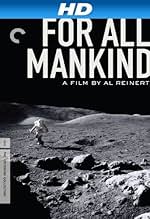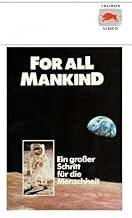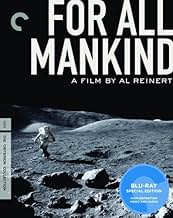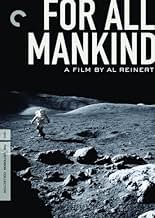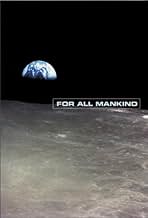For All Mankind - Ein großer Schrit für die Menschheit
Originaltitel: For All Mankind
IMDb-BEWERTUNG
8,1/10
6770
IHRE BEWERTUNG
Ein ausführlicher Blick auf verschiedene NASA-Mond-Landemissionen, beginnend mit Apollo 8.Ein ausführlicher Blick auf verschiedene NASA-Mond-Landemissionen, beginnend mit Apollo 8.Ein ausführlicher Blick auf verschiedene NASA-Mond-Landemissionen, beginnend mit Apollo 8.
- Für 1 Oscar nominiert
- 3 Gewinne & 3 Nominierungen insgesamt
Jim Lovell
- Narrator - Apollo 8, Apollo 13
- (Synchronisation)
- (as James A. Lovell Jr.)
Ken Mattingly
- Narrator - Apollo 16
- (Synchronisation)
- (as T. Kenneth Mattingly II)
Russell Schweickart
- Narrator - Apollo 9
- (Synchronisation)
- (as Russell L. Schweickart)
Eugene Cernan
- Narrator - Apollo 10, Apollo 17
- (Synchronisation)
- (as Eugene A. Cernan)
Mike Collins
- Narrator - Apollo 11
- (Synchronisation)
Charles Conrad
- Narrator - Apollo 12
- (Synchronisation)
- (as Charles P. Conrad Jr.)
Richard Gordon
- Narrator - Apollo 12
- (Synchronisation)
- (as Richard F. Gordon Jr.)
Alan Bean
- Narrator - Apollo 12
- (Synchronisation)
- (as Alan L. Bean)
Jack Swigert
- Narrator - Apollo 13
- (Synchronisation)
- (as John L. Swigert Jr.)
Stuart Roosa
- Narrator - Apollo 14
- (Synchronisation)
- (as Stuart A. Roosa)
James Irwin
- Narrator - Apollo 15
- (Synchronisation)
- (as James B. Irwin)
Charles Duke
- Narrator - Apollo 16
- (Synchronisation)
- (as Charles M. Duke Jr.)
Harrison Schmitt
- Narrator - Apollo 17
- (Synchronisation)
- (as Harrison H. Schmitt)
Buzz Aldrin
- Self
- (Archivfilmmaterial)
Bill Anders
- Self
- (Archivfilmmaterial)
Neil Armstrong
- Self
- (Archivfilmmaterial)
Stephen Bales
- Self
- (Archivfilmmaterial)
- (as Steve Bales)
Frank Borman
- Self
- (Archivfilmmaterial)
Handlung
WUSSTEST DU SCHON:
- WissenswertesThe staging footage was captured because NASA wanted to document the flight process of an unmanned Saturn flight for feedback in case there was a failure for engineers to look at footage to see what went wrong. Cameras were mounted in strategic locations, kicking on at critical moments to document the staging process for less than half a minute. After completion, the light-tight canisters containing the exposed film were jettisoned, dropping to earth with homing beacons and parachutes inside protective heat shields. Air Force C-130 transport planes, towing gigantic nets, recovered the canisters in the southern Atlantic Ocean.
- PatzerThe opening of the documentary incorrectly states that: "During the four year between December 1968 and November 1972, there were nine manned flights to the moon." The last lunar mission, Apollo 17, took place in December 1972.
- Zitate
Charles M. Duke Jr.: The only bad part about zero gravity in Apollo was goin' to the bathroom. We had a very crude system. For your feces it was a bag, and you put this bag in the right position. So you go, but the only thing is that nothing goes to the bottom of the bag in zero gravity.
- Crazy CreditsFilmed on location by the United States National Aeronautics and Space Administration.
- SoundtracksSirens
Courtesy of Opal Records (Music For Films III)
Written and Performed by Daniel Lanois and Brian Eno
Licensed by Upala Music/Hamstein (BMI)
Ausgewählte Rezension
I saw this film at a very, very young age and I suspect that it is the reason I developed a heavy interest in space exploration. I recently saw this again for the first time in many years since all I had was a vague recollection of it. And after watching many times since then I have no problem saying that this is one of the best documentaries ever made.
One must give the film's director, Al Reinert, at a ton of credit for his work. Who else could have come up with the brilliant notion behind this film? Who would have thought of taking footage from all of the Apollo missions (and a couple of the Gemini missions) and combining them with the words of the men who went where no one had (or has since) gone before? (Apologies for paraphrasing Star Trek) The genius of this film is that it shuns away from traditional documentary styling. Instead of compiling facts on one mission and having a well known actor/actress do the narration, the film lets those who went tell the story. Who else is better qualified? They might not be professional actors, but the astronauts don't need to be. It is the power of the events they describe that is the main reason for their presence. They are a powerful voice in this story.
In many reviews I have read, I have seen complaints about the mixing of footage or the use of footage out of its context (a Gemini reentry used for the TLI burn for example). Yes the mixing is nowhere near subtle and is, thus, blatantly obvious. But it is my feeling that this mixing was necessary. The only way to get across the story of Apollo's achievement to the average person was to mix the footage. Does it really matter in the end? I mean by that this: the film isn't about a single mission to the Moon. No, the power of Apollo lies not in each mission, but in the overall effect of the Apollo program. This film is about the journey of Apollo, the effect in had on the astronauts, and the effect it had on us all.
If there is one element of this film that really stayed with men it was the music. It is among the most beautiful and haunting things you will ever here. Brian Eno does a marvelous job of conveying the mystery and majesty of both space and the Moon. This is one of those scores who really have to hear to believe.
For All Mankind, perhaps better then anything else out there, demonstrates the power of humanity in space. For one to really appreciate this film it needs to be seen on a large screen in surround sound. Only then can one appreciate both the film and the power of the Apollo legacy. This is the first film I've seen that I recommend to everyone. This is a film that is truly "For All Mankind".
One must give the film's director, Al Reinert, at a ton of credit for his work. Who else could have come up with the brilliant notion behind this film? Who would have thought of taking footage from all of the Apollo missions (and a couple of the Gemini missions) and combining them with the words of the men who went where no one had (or has since) gone before? (Apologies for paraphrasing Star Trek) The genius of this film is that it shuns away from traditional documentary styling. Instead of compiling facts on one mission and having a well known actor/actress do the narration, the film lets those who went tell the story. Who else is better qualified? They might not be professional actors, but the astronauts don't need to be. It is the power of the events they describe that is the main reason for their presence. They are a powerful voice in this story.
In many reviews I have read, I have seen complaints about the mixing of footage or the use of footage out of its context (a Gemini reentry used for the TLI burn for example). Yes the mixing is nowhere near subtle and is, thus, blatantly obvious. But it is my feeling that this mixing was necessary. The only way to get across the story of Apollo's achievement to the average person was to mix the footage. Does it really matter in the end? I mean by that this: the film isn't about a single mission to the Moon. No, the power of Apollo lies not in each mission, but in the overall effect of the Apollo program. This film is about the journey of Apollo, the effect in had on the astronauts, and the effect it had on us all.
If there is one element of this film that really stayed with men it was the music. It is among the most beautiful and haunting things you will ever here. Brian Eno does a marvelous job of conveying the mystery and majesty of both space and the Moon. This is one of those scores who really have to hear to believe.
For All Mankind, perhaps better then anything else out there, demonstrates the power of humanity in space. For one to really appreciate this film it needs to be seen on a large screen in surround sound. Only then can one appreciate both the film and the power of the Apollo legacy. This is the first film I've seen that I recommend to everyone. This is a film that is truly "For All Mankind".
- timdalton007
- 11. Apr. 2007
- Permalink
Top-Auswahl
Melde dich zum Bewerten an und greife auf die Watchlist für personalisierte Empfehlungen zu.
- How long is For All Mankind?Powered by Alexa
Details
- Erscheinungsdatum
- Herkunftsland
- Sprache
- Auch bekannt als
- For All Mankind
- Drehorte
- Sea of Tranquility, The Moon, Space(Apollo 11 landing site)
- Produktionsfirmen
- Weitere beteiligte Unternehmen bei IMDbPro anzeigen
Box Office
- Bruttoertrag in den USA und Kanada
- 770.132 $
- Eröffnungswochenende in den USA und in Kanada
- 33.777 $
- 5. Nov. 1989
- Weltweiter Bruttoertrag
- 770.366 $
- Laufzeit1 Stunde 20 Minuten
- Farbe
- Sound-Mix
- Seitenverhältnis
- 1.37 : 1
Zu dieser Seite beitragen
Bearbeitung vorschlagen oder fehlenden Inhalt hinzufügen

Oberste Lücke
By what name was For All Mankind - Ein großer Schrit für die Menschheit (1989) officially released in India in English?
Antwort


